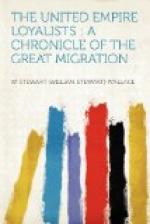This difficulty which many of the Loyalists felt with regard to the justice of the position taken up by the British government greatly weakened the hands of the Loyalist party in the early stages of the Revolution. It was only as the Revolution gained momentum that the party grew in vigour and numbers. A variety of factors contributed to this result. In the first place there were the excesses of the revolutionary mob. When the mob took to sacking private houses, driving clergymen out of their pulpits, and tarring and feathering respectable citizens, there were doubtless many law-abiding people who became Tories in spite of themselves. Later on, the methods of the inquisitorial communities possibly made Tories out of some who were the victims of their attentions. The outbreak of armed rebellion must have shocked many into a reactionary attitude. It was of these that a Whig satirist wrote, quoting:
This word, Rebellion, hath frozen
them up,
Like fish in a pond.
But the event which brought the greatest reinforcement to the Loyalist ranks was the Declaration of Independence. Six months before the Declaration of Independence was passed by the Continental Congress, the Whig leaders had been almost unanimous in repudiating any intention of severing the connection between the mother country and the colonies. Benjamin Franklin told Lord Chatham that he had never heard in America one word in favour of independence ‘from any person, drunk or sober.’ Jonathan Boucher says that Washington told him in the summer of 1775 ’that if ever I heard of his joining in any such measures, I had his leave to set him down for everything wicked.’ As late as Christmas Day 1775 the revolutionary congress of New Hampshire officially proclaimed their disavowal of any purpose ‘aiming at independence.’ Instances such as these could be reproduced indefinitely. When, therefore, the Whig leaders in the summer of 1776 made their right-about-face with regard to independence, it is not surprising that some of their followers fell away from them. Among these were many who were heartily opposed to the measures of the British government, and who had even approved of the policy of armed rebellion. but who could not forget that they were born British subjects. They drank to the toast, ’My country, may she always be right; but right or wrong, my country.’




